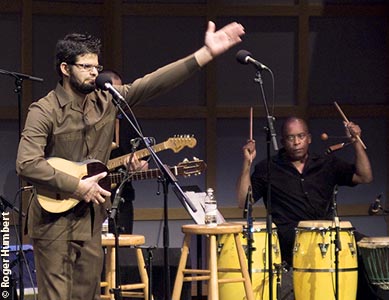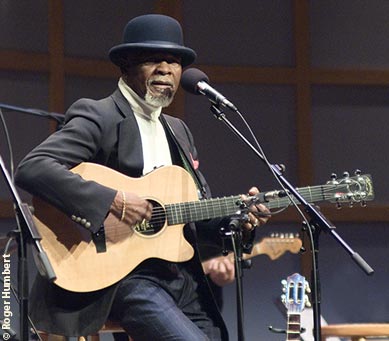 |
David Rudder’s Calypso Journey with Lord Superior & Drew Gonsalves
presented by CBC Radio 1 & Radio 2
|
|
| February 29, 2008 • Glenn Gould Studio • Toronto |
|
|
|
|
|
|
T’N’T a Hit at Glenn Gould
by Joyce Corbett with photos by Roger Humbert |
| When we (most of us non-Trinidadians) think calypso and soca, we think fun and party. But traditionally, calypso (or kaiso as it used to be known) is just as importantly a means of communication (which doesn’t exclude “fun and party”); a means of relating funny stories (often with a serious side), of commenting on political and social events and trends, of disseminating the truth when the truth is being obscured. It was and is about wordplay and poetry as much as it is about rhythm and dancing.
On this night at the Glenn Gould, we were to travel in both time and space, back and forth from Canada to Trinidad and Tobago, back as far as the 1930s and forward to today. As the band started up, the three calypsonians, David Rudder, Lord Superior and Drew Gonsalves walked on stage singing “Hey, let’s have a party, a Caribbean party!” In no time, we were all “groovin’ to the sounds of the Caribbean” as David Rudder welcomed us and all those who would be listening to the show on radio from British Columbia to Newfoundland and that much colder isle in the north, Baffin Island; radio is still magic.
The first part of the first half of the show was then handed over to Drew Gonsalves, the youngest of the Calypsonians on stage, a Trinidadian now resident in Toronto. Gonsalves is a great admirer of the kaiso tradition and demonstrated a deep knowledge of its history as he moved through his set of songs with a preamble to each.
Starting with his own tragic “Abatina” Gonsalves invited the crowd to sing the refrain which, he explained, was taken from a tune of the 1930s by The Roaring Lion (Hubert Raphael Charles). In contrast to the full instrumentation of “Abatina”, “Money is King” was accompanied only by Gonsalves on cuatro, Muhtadi Thomas on barrel drum, band members working shakers and the sparse but effective addition of muted trumpet. This effective switch was probably in keeping with how the piece might have been done by its author, The Roaring Tiger, who wrote the song in the “dirty thirties”.
|
|
After the roots, come the branches, Drew Gonsalves informed us as he launched into the “rapso”, of his own “St. James”, pure poetry. Dancing and rum bottle percussion accompanied “Corbeaux Following” and “Rum and Coca-Cola” provided a rousing finale. It seemed the entire audience started to sing along as soon as the initial notes were played. “Rum and Coca-Cola” was a huge hit for the Andrews Sisters in the 1940s, prompting its original author/composers, Lionel Belasco and Lord Invader to sue for copyright infringement. Fortunately, they won. How do I know? In true calypsonian fashion, Drew Gonsalves shares his stories.
The next segment of the show belonged to Lord Superior (Andrew Marcano). Accompanied by clamorous applause, “Supy”, as he is called affectionately by his fans, took his seat, guitar in hand and introduced his first song. Written in the period of the cold war about the race to the moon it was “First Things First”. The title became ironic as he reversed the verses and gave us a sneak preview of his extraordinary skill at “extempo” (from extemporize, like freestyling). He followed this with serious, fun and playfully blasphemous songs: about black unity and identity “I don’t care where you’re born you’re African” which made me think of Peter Tosh’s “African”; “I’d Rather be in love with a girl born in January” and about visiting the pope to set him straight on celibacy “every homosapien needs sexual gratification, Amen”.
|
|

Drew Gonsalves & Muhtadi Thomas |
|

Lord Superior |
|
|
| The host, Andrew Craig, stepped up to the microphone at this point announcing that it was time for a little extempo, which he explained as improvising rhyming couplets on subjects shouted out from the audience. On this night — snow, Obama, Hilary Clinton and Steven Harper were the subjects. The quickness of Lord Superior’s response was impressive as he composed on the spot. This might be good exercise to keep your mind in shape as you age. It seems to have worked for Lord Superior through his more than fifty-year career.
How to follow that? With a song about more power for women (“Woman On Top”) and a song about a doctor’s son who wanted to play steel drum (very taboo), featuring the fine steelpan of Jeremy Ledbetter. “You haven’t seen carnival if you haven’t been to Trinidad” provided a celebratory ending to the first half of the evening.
The second half of the show was David Rudder’s. Admittedly my knowledge of soca and calypso is scant, yet, I feel that I can state with confidence David Rudder is a unique artist. His greatest strength seems to be to pull people up and inspire them like a preacher, as he alludes himself when he tells us that for the next hour the Glenn Gould Studio will be transformed into the Holy Temple of Soca.
|

David Rudder |
| David Rudder has the ability to embody the people of Trinidad and Tobago, to reflect them back to themselves, especially those who have moved to Canada and long for home, like himself. Rudder makes his entrance from the back of the theatre walking down the centre aisle singing a cappela. It’s music as medicine “if you’ve a hole in your soul…there’s a man with a song”. It’s gospel, the piano tells us and it’s also party time! “We’re going to get out of hand” with “songs to make a politician cringe”, to “turn a woman’s hips to jelly” and make you “shake like Shango”. It’s “Calypso Music”.
Much of the crowd knows every word to the songs. And they listen closely to Rudder’s tales. His words and delivery create vivid images in his introduction to “Song for A Lonely Soul”. Those long-faced people walking down Yonge Street in February, they’re from Trinidad and Tobago, they are longing to be back in the heat eating a mango, the sticky sweet juice bursting forth and running down their skin. The audience hangs on every word.
“I’d Rather Be in Trinidad” carries on in the same vein. It’s the island man looking out at the slush from his office window and wondering what he’s doing here where it gets dark at three in the afternoon. Then there’s “Trini 2 de Bone” that soon has everyone participating in choruses of “sweet, sweet T&T”. He brings Trinidad and Tobago to us, telling the tourist about the real thing. If you’re looking to be served by the pool by people in neat little uniforms go somewhere else. Trinidad and Tobago has beautiful beaches but it’s the people, it’s the food, it’s the crab running across the sand. In T&T, they will tell you here’s the curry, here’s the plates and the cutleries (because they put an “s” on everything, Rudder says) we’re going for a swim.
|
| When Rudder introduces “The Ganges Meets the Nile”, he says we are not unlike a Trinidadian audience in that when he looks out at us, he sees people of many ethnicities. Two of the main groups in Trinidad and Tobago are East Indian and African. Trinidad is a place where the Ganges and the Nile meet and flow together. “Children of the Flag” is a song from his new album to be released in July. He sets it up with a description of going through the Trinidadian countryside and seeing the bamboo poles with flags people plant in front of their houses. If you know how to read the flags, you will know if the people who live there are African or Indian. |
|

David Rudder |
|
| “The Hammer”, about looking for the great Trinidadian steel pannist Rudolph Charles, was very well-received. Not surprising, as, recorded in 1986, it is still one of the best-selling songs in the history of calypso. A solemn and unexpected (for me) piece was “Jerusalem” where “every home seems to have a weeping wall”. Part of Rudder’s message here is that no matter what the troubles are in Trinidad they are small compared to that, but be careful, conflicts can escalate. There are many parts of the world where people have coexisted peacefully in the past and now seem engaged in a seemingly unstoppable cycle of violence. But Rudder does not end on this solemn note. The show finishes with everyone back on stage singing “You haven’t seen carnival if you haven’t been to Trinidad”. No doubt about it, T & T in Toronto ended in a joyous blast! |
|
The band
David Rudder – vocals
Lord Superior – vocals, guitar
Drew Gonsalves – vocals, cuatro
Jeremy Ledbetter – leader, piano/keyboards, steelpan
Duane Sampson – electric & acoustic bass
Jan Morgan – trumpet
Esteban Carvallo – guitar
Terry Woode – trombone
Andrew Spencer – drums
Muhtadi Thomas – percussion |
|
|
|
|
|





